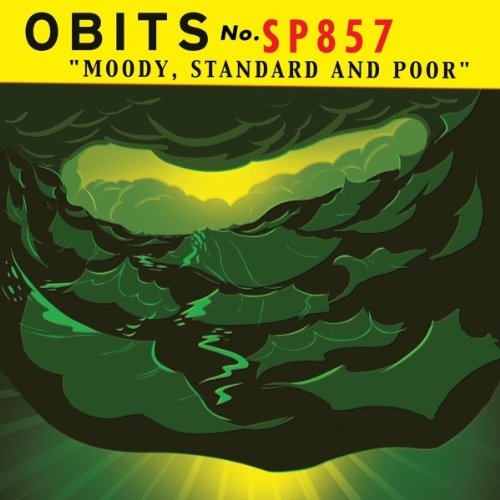
Obits
Moody, Standard and Poor
Release Date: Mar 29, 2011
Genre(s): Pop/Rock, Alternative/Indie Rock, Alternative Pop/Rock, Garage Punk, Indie Rock, New Wave/Post-Punk Revival
Record label: Sub Pop
Music Critic Score
How the Music Critic Score works
Buy Moody, Standard and Poor from Amazon
Album Review: Moody, Standard and Poor by Obits
Great, Based on 7 Critics
Based on rating 83%%
First, a little name dropping: Rick Froberg used to be in Pitchfork, Drive Like Jehu and Hot Snakes; Sohrab Habibion used to be in Edsel; Scott Gursky used to be in Shortstack; and Greg Simpson might be the luckiest bassist ever. When their four powers combine, they are Obits. As first displayed on the band’s 2009 debut, I Blame You, Froberg is no longer hollering his way through a dozen or so tracks as he has in the past.
Based on rating 8/10
For those that have feared that seminal Seattle, Washington, indie label Sub Pop has strayed too far from its sweaty grunge rock roots in favor of gentle folk acts and well-scrubbed indie popsters, the presence of New York’s rough-and-ready garage rock revivalist Obits offer plenty of reassurance to the contrary. Never ones to go easy on the volume knob or shun the joys of distorted electric guitar, Obits turned out an impressive debut in 2009 with I Blame You, a combustible powder keg of an album. Following that triumphant start, Sub Pop has now issued Moody, Standard and Poor (recorded in the group’s home base of Brooklyn), which reveals itself to be another winner overstuffed with sweat-soaked gems that never relent.
Based on rating 8/10
Subtlety is not something you would typically associate with a punk band. Moody, Standard and Poor, the second album from Obits is just that: a subtle punk rock album. On first listen, there doesn’t appear to be an awful lot going on. There’s a lot of space. The songs are allowed to breathe ….
Based on rating 8/10
On their debut album, 2009's I Blame You, the Obits sounded like a potentially great band whose members were still figuring out how to write material that matched the force and power of their sound. The Obits' second album, Moody, Standard and Poor, suggests that they still haven't resolved the minor flaws that dogged I Blame You, but this time around that seems to matter less. What made I Blame You work was the way Rick Froberg and Sohrab Habibion bounced their guitars off one another -- lean, echo-laden leads wrapped around thick, chunky chords that complemented one another like tequila and lime -- and bassist Greg Simpson and drummer Scott Gursky gave them just the right sturdy platform for their six-string interplay, and over the course of two years the band has only gotten tighter, better, and stronger at what it does.
Based on rating 7.0/10
In many ways, Obits' new album, Moody, Standard And Poor, is the complete opposite of their debut, 2009's I Blame You. The production values have been stripped down, with many tracks lacking the previous album's surf-punk sheen. Where vocalist/guitarist (and former Hot Snakes/Drive Like Jehu member) Rick Froberg would once unleash his paint-peeling yell, he instead continues refining his voice as an actual singer (how much of this choice can be attributed to last year's throat injury is up in the air).
Based on rating 6.8/10
If there's one thing Obits don't have, it's a hip new sound. When the New York City-based quartet's debut, I Blame You, arrived in 2009, it sounded refreshingly back-to-basics. The band played amped-up roots rock-- twangy Creedence Clearwater Revival riffs delivered at speedy, Wipers-worthy tempos. No samplers and no drum machines, just four scowling dudes and some tube amps.
Opinion: Very Good
When it comes to crafting succinct blasts of scrappy, blues-driven rock ‘n’ roll, there are few bands right now doing it with more spry spunkiness than Brooklyn’s Obits. With the musical economy of Spoon but the wiry performance practice of, say, The Strokes or The Walkmen, Obits fuses unrelenting grooves and urgent tempos with careening stabs of guitar squall alongside frontman Rick Froberg’s fiery, howl-at-the-moon vocals. Some may say it’s merely a 21st century update on a sound that the Stooges and MC5 patented more than 40 years ago, but at a time when more tends to be more in indie rock, Obits’ taut and muscular post-punk seems shockingly fresh in its terse volatility.
'Moody, Standard and Poor'
is available now

